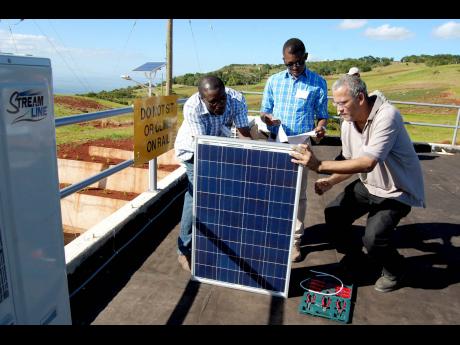Wigton could stimulate renewables revolution
"BY BEING natural and sincere, one often can create revolutions without having sought them."
The Wigton Wind Farm team could be drawing inspiration from these words by French fashion designer Christian Dior, as it rolls out a training programme designed to fuel interest and inspire further action on renewable energy in Jamaica.
"It is open to anybody who has an interest. It is open to the general public," said Sanja Simmonds, engineer and training coordinator at the wind farm, which is located at Rose Hill in Manchester where they began the renewable energy training courses this year.
In January, the farm trained 20 people from across sectors -- private and public, and including students as young as 19 years old -- in photovoltaics.
"Once you have an interest, it just goes from there," Simmonds noted. "(The training) is how we can stimulate that interest and have greater interest for the technologies."
The first training course ran for three days, as will the next one looking at solar thermal energy to be held in April.
The third training course, which will focus on wind energy and hydro, will be held in July. The final one for the year will be held in November and focus on bio-energy.
Up to now, Simmonds said they had been careful to avoid over saturation, with each course having a cap of 15 participants, with provisions for no more than an additional five.
"We don't want anyone lost. If you have too many people, you may have persons sitting around and not paying attention. What we want is for participants to be fully engaged and hands on," he said.
"The delivery of the first course was extremely effective, based the feedback we got. The training courses are not for you to you only to come and sit down before a PowerPoint. It is 50 per cent theory and 50 per cent practical. So we had participants (from the first training course) actually doing, for example, photovoltaic installation, sizing wires, sizing panels, etc.," Simmonds added.
The training coordinator explained further the thinking behind Wigton's efforts.
"Previously Wigton's tagline was 'Making renewables a breeze'. Now our tagline is 'securing Jamaica's energy future'. To secure the energy future, you could do it in multiple ways. You could do it from a commercial point of view, which is what Wigton is. So we harness clean energy from the wind," he explained.
"You could also do it from a technical standpoint, which is where we train. So we are trying to create interest in renewable energy and ensure that people have a better appreciation for it. So it is two fold -- the commercial side and the technical side," the engineer added.
The plan, he said, is to have the programme be annual.
"The courses will develop as time goes on. We didn't want to start it five days and then people wanted three. So we started it on a minimal scale to see what the feedback would be like and the feedback was really exceptional," Simmonds said.
"So now we will look at expanding the courses. Maybe in the future we will have five days of courses or even two weeks," he said.
They also have their sights set on having the courses accredited.
"Currently it is just a certificate of participation (that participants receive), but as we go along, we are trying to figure out how we can get the courses certified," Simmonds noted.
He was, however, quick to emphacise: "We are not trying to compete against the other institutions providing the training. What we are trying to do is stimulate the interested among the general public and then grow that interest."
"When we talk about the energy policy, one of the core parts of it is to increase renewable energy penetration into the grid. If you are to do so, you have to make people aware of the type of the technologies that you are pushing," he added.


